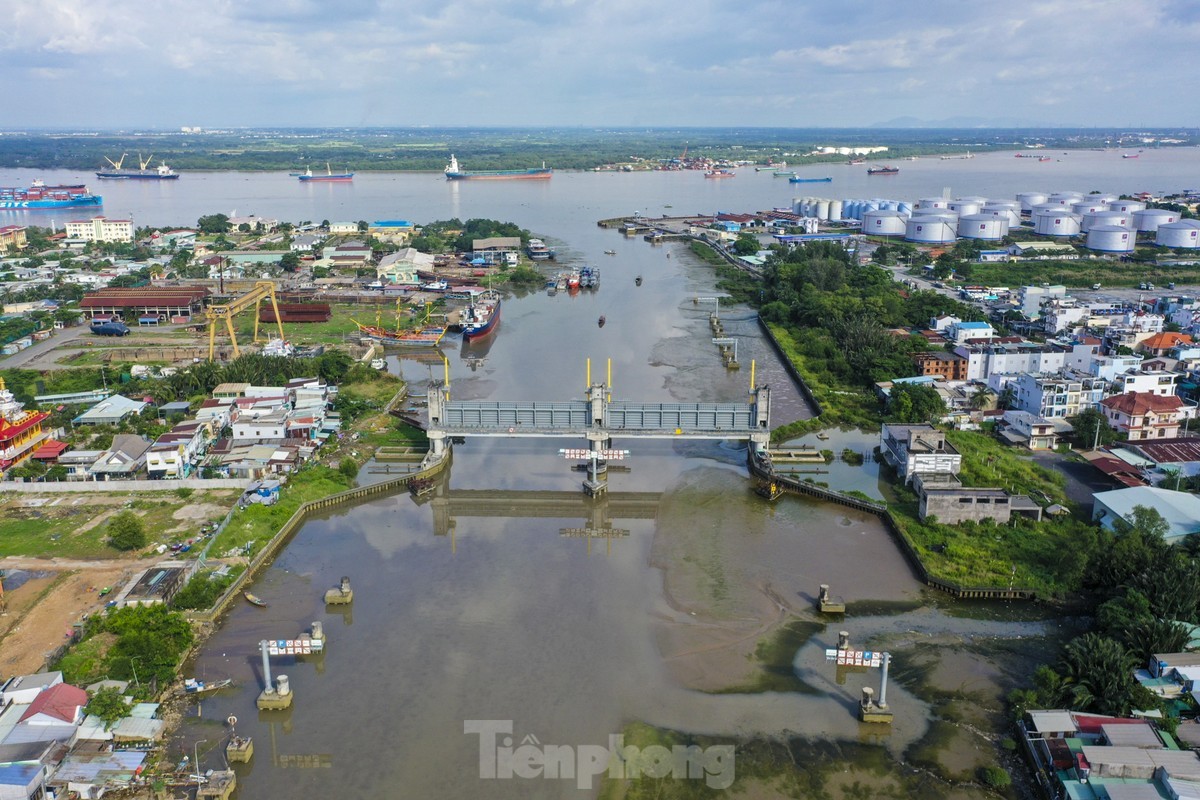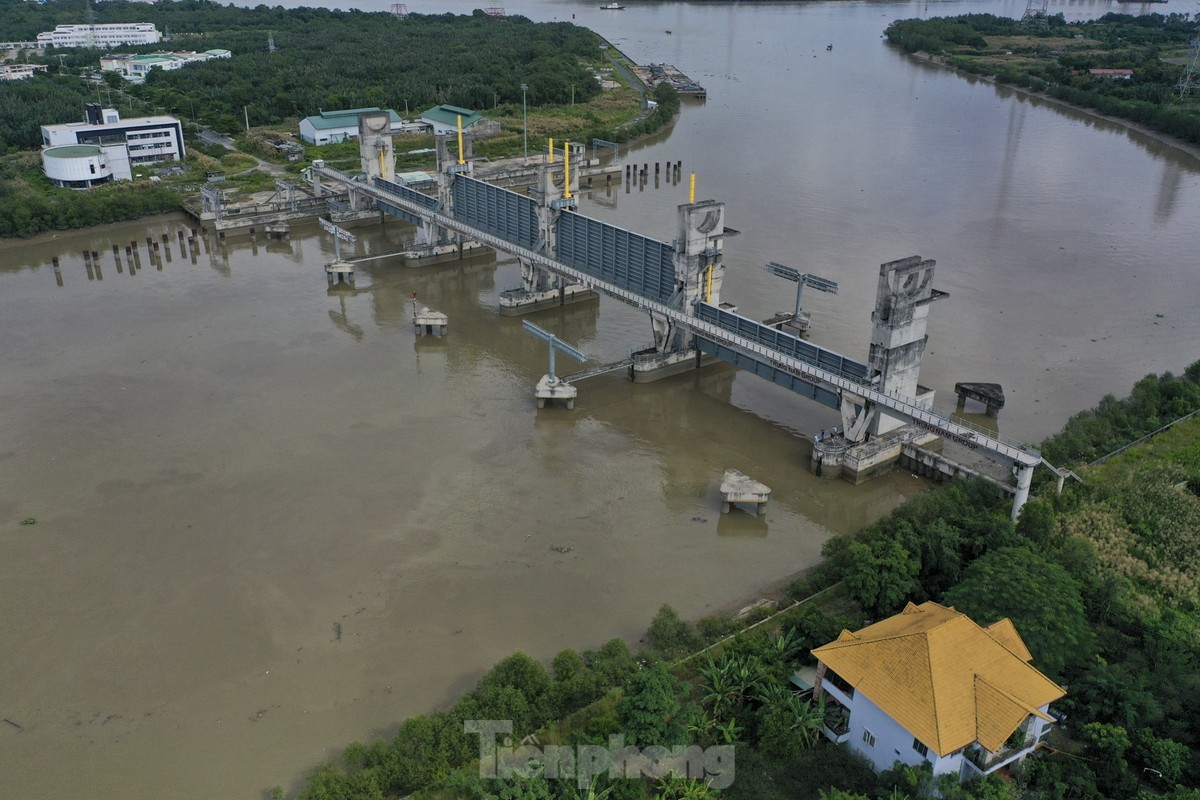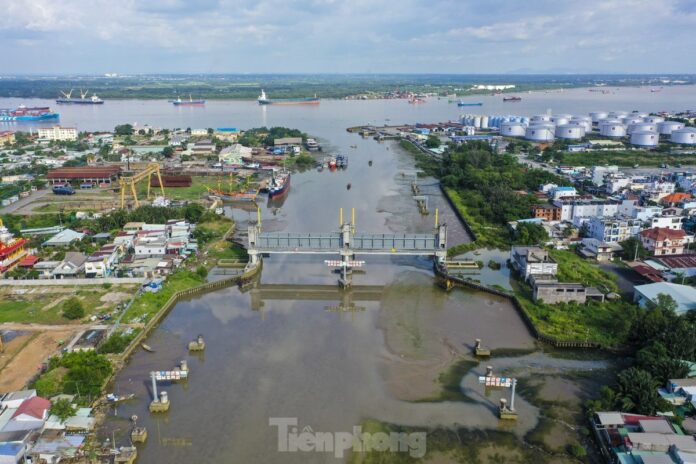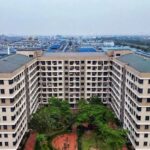Five Years of Stagnation: Unblocking a Crucial Flood Prevention Project in Ho Chi Minh City
The project to control flooding in Ho Chi Minh City due to tidal influences, taking into account climate change factors – Phase 1, is considered one of the key infrastructure projects in the city. With a total investment of nearly VND 10,000 billion in the form of a Build-Transfer (BT) contract, the project is undertaken by Trung Nam Group and commenced in mid-2016.
The project’s scope includes six large tidal control gates (Tan Thuan, Ben Nghe, Phu Xuan, Muong Chuoi, Cay Kho, and Phu Dinh) combined with nearly 8 km of river dikes to control tides, prevent saltwater intrusion, and regulate rainwater. Upon completion, the project is expected to protect an area of over 570 km², accommodating approximately 6.5 million people living in the central area of Ho Chi Minh City and along the Saigon River – a region frequently threatened by flooding due to high tides and heavy rainfall.
Designed to bring about a transformative change in the city’s flood prevention capabilities, the project initially aimed for a swift completion within three years. However, from 2020 onwards, the entire project has been forced to halt construction due to legal complications and the inability to finalize BT payment procedures. Specifically, according to the contract signed before the Law on Investment in the form of Public-Private Partnership (PPP) took effect, Ho Chi Minh City was to reimburse the investor through land funds. Nevertheless, procedures related to land valuation and approval of the payment method are yet to be completed.

Phu Xuan Gate – One of the six large tidal control gates in the VND 10,000 billion anti-flooding project. Photo: Duy Anh
The main reason for the project’s stagnation is the legal hurdles and the unresolved BT payment procedures. As explained by the investor, the project’s suspension has resulted in significant losses for the company. Additional costs, particularly bank loan interests, have amounted to over VND 1.7 billion per day. Furthermore, despite completing more than 90% of the project, it remains dormant while flooding and high tides continue to pose threats to the lives of residents in the affected areas.
Recently, the Ministry of Finance presented a Government report and draft resolution to address the difficulties and obstacles related to two BT projects in Ho Chi Minh City. These include the tidal flood control project in Ho Chi Minh City, considering climate change factors in Phase 1, and the project to construct a road section connecting Pham Van Dong Street to Go Dua intersection on National Highway 1 in Thu Duc City (belonging to Ho Chi Minh City’s Ring Road 2).
According to the Ministry of Finance, these two BT projects have been ongoing for an extended period. Despite directives from the Government and the Prime Minister instructing relevant ministries, sectors, and the City’s People’s Committee to address the issues, they have not been conclusively resolved. Consequently, procedures for payment to investors have not been carried out, and both projects have ceased construction since 2020.
Prolonging the implementation of these two BT projects will result in increased investment costs, wasting resources from the State, investors, and society. It will also negatively impact the lives and well-being of residents in the project areas and affect the confidence of investors. Therefore, to unblock this bottleneck and mobilize social resources effectively, it is necessary to resolve the projects’ obstacles.
Unraveling the Knot: Proposed Solutions for a Crucial Project
To ensure the timely resolution of difficulties and obstacles regarding these two BT projects, following the directions of the Central Internal Affairs Committee and the Government, it is crucial to expedite their completion and avoid wasting resources from the State, businesses, and society. The Ministry of Finance proposes developing a separate Government Resolution to address the challenges specifically for these projects.
Currently, Ho Chi Minh City is in the process of making adjustments (the nature of the project remains unchanged, but the total investment increases due to extended implementation and accrued loan interests), with a total adjusted value of over VND 10,000 billion.
Based on the reception, explanation, and opinions of the Ho Chi Minh City People’s Committee and relevant ministries and agencies, the Ministry of Finance proposes the following:
Regarding the adjustment of the two BT projects, the Ministry of Finance states that the BT contracts for these projects were signed between the Ho Chi Minh City People’s Committee and the investors before the Law on Investment in the form of Public-Private Partnership (PPP) came into force. According to regulations, these projects will continue to be implemented and settled according to the provisions of the signed BT contracts and the laws in force at the time of contract conclusion.
Additionally, the proposal by the Ho Chi Minh City People’s Committee to allow the city to adjust the project’s feasibility report without undergoing the procedure for adjusting the investment policy is legally grounded.

The project includes six tidal control gates (Tan Thuan, Ben Nghe, Phu Xuan, Muong Chuoi, Cay Kho, and Phu Dinh). Photo: Duy Anh
On the matter of recapitalization, the State Bank of Vietnam has affirmed that it will adjust the recapitalization decision to continue disbursing approximately VND 1,800 billion to BIDV after the Ho Chi Minh City People’s Committee, the BT investor, and BIDV complete the adjustment procedures, sign the BT and credit contracts, and BIDV requests an adjustment to the recapitalization decision.
Concerning the land fund for investor payment, according to the Ministry of Finance, for the group of land funds subject to rearrangement and handling of public assets as stipulated in Clause 7, Article 6 of Resolution No. 98 of the National Assembly, the Ho Chi Minh City People’s Committee has the authority to decide. For the group of land funds that have been cleared by the State, the implementation must comply with the provisions of Clause 1, Article 17 of Decree No. 69/2019/ND-CP, amended and supplemented in Clause 3, Article 90 of Decree No. 35/2021/ND-CP.
Furthermore, the Ministry of Finance states that the settlement of the BT contract shall be made through land funds on an equal value basis. If there is a difference, it shall be settled by cash or other land funds. Therefore, the Ministry proposes that the Ho Chi Minh City People’s Committee settle the BT contract through land funds, and if the value of the land fund is less than the value of the signed contract, the remaining amount shall be paid in cash from the city’s public investment capital. The city is fully responsible for determining the specific land prices for calculating land use fees and land collection in the planned payment areas, ensuring compliance with land-related laws and regulations.
The Ho Chi Minh City People’s Committee is requested to coordinate with the State Audit Office to conduct an audit of the project as a basis for organizing the settlement and finalization of investment capital construction costs in accordance with the law, ensuring a balance of interests between the State and the investor, the efficiency of the use of state capital, and the early operation and exploitation of the project to avoid waste and loss.
“Developer Requests Lifting of Transaction Block on Millennium Project in District 4”
“Phat Dat Real Estate Development JSC (HOSE: PDR) on May 29, 2025, announced the First Instance Judgment of the Ho Chi Minh City People’s Court dated May 13, 2025, regarding the Millennium Project located on a 132 Ben Van Don land lot in District 4.”
“HCMC Construction Department Clarifies Conditions for Selling Future Housing in NVL’s Victoria Village Project”
On May 26, the Ho Chi Minh City Department of Construction issued a document to Thai Binh Real Estate Business Joint Stock Company (TBLC) confirming eligibility to sell 1,044 future condominium units in a high-rise project within a 42,777 sqm residential area in Thanh My Loi Ward, Thu Duc City.





















